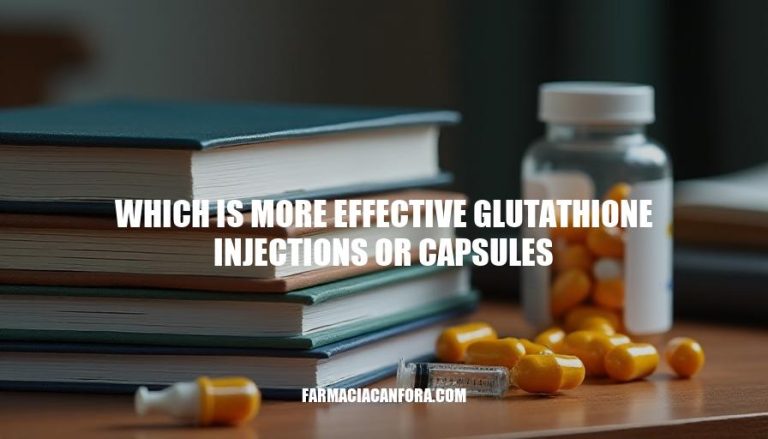


Glutathione is a powerful antioxidant crucial for maintaining overall health and wellness. It helps protect cells from oxidative stress, supports immune function, and detoxifies the body. This article will compare the effectiveness of glutathione injections versus capsules, providing insights into which method might be more beneficial for your health needs.
Glutathione is a powerful antioxidant composed of three amino acids: glutamate, cysteine, and glycine. It plays a crucial role in detoxifying the body, protecting cells from oxidative stress, and supporting the immune system.
Injections vs. Capsules:
Injections: Glutathione injections deliver the antioxidant directly into the bloodstream, bypassing the digestive system. This method ensures maximum bioavailability and immediate utilization by the body’s cells, leading to faster and more noticeable effects.
Capsules: When taken orally, glutathione must pass through the digestive system, where its absorption can be significantly reduced. Even with advancements like liposomal technology, which enhances absorption, the bioavailability of oral glutathione is generally lower compared to injections.
Glutathione injections offer several benefits due to their direct introduction into the bloodstream, which ensures higher bioavailability compared to oral supplements. Here are the key points:
Enhanced Absorption: Intravenous (IV) administration bypasses the digestive system, leading to nearly 100% bioavailability. This means the body can utilize glutathione more effectively and quickly.
Skin Health: Glutathione injections can improve skin health by reducing hyperpigmentation, lightening dark spots, and promoting an even skin tone. They also help reduce wrinkles and improve the appearance of acne scars.
Immune System Support: As a potent antioxidant, glutathione helps neutralize free radicals and boosts immune cell function. This can enhance the body’s ability to fight infections and reduce inflammation.
Detoxification: Glutathione plays a crucial role in detoxifying the liver and removing toxins from the body. This helps protect cells from oxidative stress and damage.
Anti-Aging Properties: By combating oxidative stress, glutathione injections can slow down the aging process, promoting overall well-being and vitality.
Energy Enhancement: These injections can help optimize cellular function and energy production, reducing fatigue and improving overall energy levels.
The direct introduction into the bloodstream ensures that glutathione reaches various tissues and organs efficiently, maximizing its therapeutic effects.
Glutathione capsules are popular for their antioxidant properties, but their effectiveness can be limited by several factors:
Absorption Challenges: The gastrointestinal (GI) tract presents barriers that can degrade glutathione before it is absorbed. This results in low bioavailability. To improve absorption, formulations like liposomal glutathione, which encapsulates the molecule in liposomes, can be more effective.
Factors Affecting Absorption:
Convenience of Oral Supplementation: Oral glutathione is easy to take and widely available, making it a convenient option for many people. However, due to the absorption issues, some may prefer intravenous or other forms of administration for better efficacy.
Bioavailability:
Convenience:
Cost:
Potential Side Effects:
Glutathione injections offer higher bioavailability, faster effects, and improved absorption compared to capsules. While capsules are convenient and widely available, their effectiveness can be limited by factors such as diet, lifestyle, and health status.
Injections provide a more direct and efficient delivery of glutathione into the bloodstream, making them a more effective option for those seeking optimal benefits. However, they require medical administration and may carry potential side effects.
Ultimately, injections are recommended for individuals who prioritize maximum bioavailability and therapeutic effects, while capsules remain a suitable choice for those who value convenience and affordability.